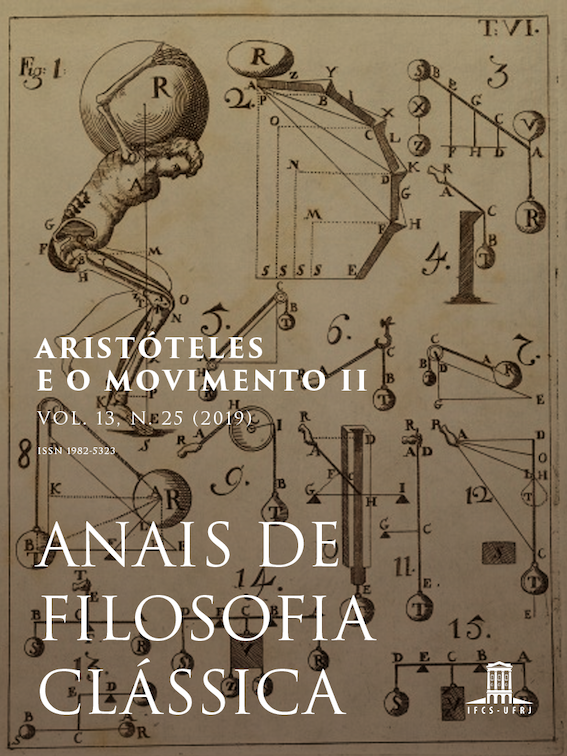Soul and Movement in Aristotle
DOI:
https://doi.org/10.47661/afcl.v13i25.24769Keywords:
Aristotle, soul, body, movement, act, potencyAbstract
In this paper, I seek to understand as the result of a study about movement, from the point of view of Aristotle, the nexus between body and soul, as it is established in the treatise ‘On the Soul’ (De anima). I’ve study the reasons that leads Aristotle to support that soul does not move, exactly because this is the principle of movement. At denying that the soul is itself a living being, the stagirita puts himself in a critical posture about the Plato’s Phaedo dialogue, openning a way to phylosofic consideration about the living body and it’s functionality. In the function (érgon) or work to make, in your be able of this work, resides the specificity of the living being that may not to pass to the act. The difference between a living and an inanimate body is accentuated, making it unavoidable to think the specificity of the living being from its manifestations. A thought about life that discovers one's own thinking as life.References
AGAMBEN, G. A potência do pensamento. Ensaios e conferências. Trad. Antônio Guerreiro. Belo Horizonte: Autêntica, 2015.
ARISTÓTELES. Metafísica. Trad. Marcelo Perini. São Paulo: Loyola, 2002.
________. Física. Trad. Gullermo R. de Echandía. Madrid: Gredos, 1995.
________. Physics (Books I-IV). Translated by P.H. Wicksteed and F.M. Cornford. London, Loeb Classical Library, 2005.
________. Physics (Books V-VIII). London, Loeb Classical Library, 2006.
________. Física I-II. Trad. Lucas Angioni. Campinas, SP: Editora da Unicamp, 2009.
________. Ethica Nicomachea I 13- III 8: tratado das virtudes. Trad. Marco Zingano. São Paulo: Odysseus, 2008.
________. The Nichomachean Ethics. Trad. H. Rackhan. London: Harvard Universty Press, 1992.
_________. De l’âme. Trad. R. Bodéüs. Paris: GF-Flamarion, 1993.
_________. On the soul, Parva naturalia, On breath. Trad. W.S. Hett. London: Harvard University Press, 2000.
_________. De anima. Trad. Maria Cecília Gomes dos Reis. São Paulo: Editora 34, 2006.
BRAGUE, R. Aristote et la question du monde: Essai sur le contexte cosmologique et anthropologique de l’ontologie. Paris: Les Éditions du Cerf, 2009.
_________. Introdução ao mundo grego: estudos de história da filosofia. Trad. Nicolás Nyimi Campanário. São Paulo: Loyola, 2007.
COULOUBARITSIS, Lambros. La Physique d’Aristote: L’avènement de la Science Physique. Bruxelles: Ousia, 1997.
PLATÃO. O Banquete – Apologia de Sócrates. Trad. Carlos Alberto Nunes. Belém, PA: EDUFPA, 2001.
________. Diálogos (Os pensadores). Trad. José Cavalcante de Souza, Jorge Paleikat e João Cruz Costa. São Paulo: Abril Cultural, 1979.
________. Phédon. Trad. Léon Robin. Paris: Les Belles Lettres, 1970.
ROBINSON, Thomas M. As origens da alma. Os gregos e o conceito de alma de Homero a Aristóteles. Trad. Alaya Dullius et al. São paulo: Annablume, 2010.
TOMÁS DE AQUINO, Santo. L’Unité de l’intellect contre les averroïstes, suivi des textes contre Averroès antérieurs à 1270(ed. bilingüe). Trad. Alain de Libera. Paris: GF-Flamarion, 1994.
WIELAND, W. Die aristotelische Physik. Untersuchungen über die Grundlegung der Naturwissenchaft und die sprachlischen Bedingungen der Prinzipienforschung bei Aristoteles. Göttingen, Vandenhoeck & Ruprecht, 1992.


